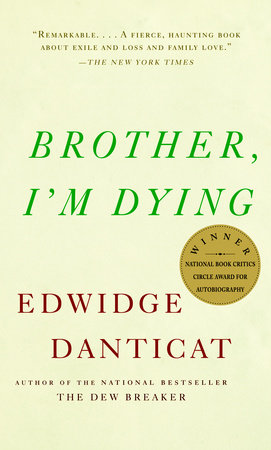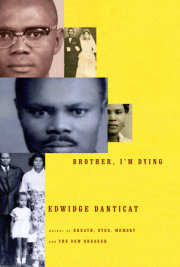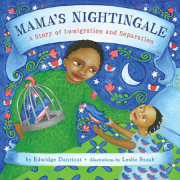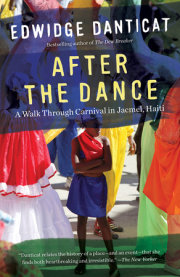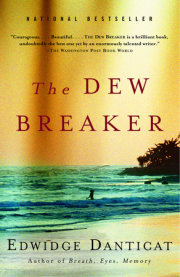Beating the DarknessOn Sunday, October 24, 2004, nearly two months after he left New York, Uncle Joseph woke up to the clatter of gunfire. There were blasts from pistols, handguns, automatic weapons, whose thundering rounds sounded like rockets. It was the third of such military operations in Bel Air in as many weeks, but never had the firing sounded so close or so loud. Looking over at the windup alarm clock on his bedside table, he was startled by the time, for it seemed somewhat lighter outside than it should have been at four thirty on a Sunday morning.During the odd minutes it took to reposition and reload weapons, you could hear rocks and bottles crashing on nearby roofs. Taking advantage of the brief reprieve, he slipped out of bed and tiptoed over to a peephole under the staircase outside his bedroom. Parked in front of the church gates was an armored personnel carrier, a tank with mounted submachine guns on top. The tank had the familiar circular blue and white insignia of the United Nations peacekeepers and the letters UN painted on its side. Looking over the trashstrewn alleys that framed the building, he thought for the first time since he’d lost Tante Denise that he was glad she was dead. She would have never survived the gun blasts that had rattled him out of his sleep. Like Marie Micheline, she too might have been frightened to death.He heard some muffled voices coming from the living room below, so he grabbed his voice box and tiptoed down the stairs. In the living room, he found Josiane and his grandchildren: Maxime, Nozial, Denise, Gabrielle and the youngest, who was also named Joseph, after him. Léone, who was visiting from Léogâne, was also there, along with her brothers, Bosi and George.“Ki jan nou ye?” my uncle asked. How’s everyone?“MINUSTAH plis ampil police,” a trembling Léone tried to explain.Like my uncle, Léone had spent her entire life watching the strong arm of authority in action, be it the American marines who’d been occupying the country when she was born or the brutal local army they’d trained and left behind to prop up, then topple, the puppet governments of their choice. And when the governments fell, United Nations soldiers, so-called peacekeepers, would ultimately have to step in, and even at the cost of innocent lives attempt to restore order.Acting on the orders of the provisional government that had replaced Aristide, about three hundred United Nations soldiers and Haitian riot police had come together in a joint operation to root out the most violent gangs in Bel Air that Sunday morning. Arriving at three thirty a.m., the UN soldiers had stormed the neighborhood, flattening makeshift barricades with bulldozers. They’d knocked down walls on corner buildings that could be used to shield snipers, clearedaway piles of torched cars that had been blocking traffic for weeks and picked up some neighborhood men.“It is a physical sweep of the streets,” Daniel Moskaluk, the spokesman for the UN trainers of the Haitian police, would later tell the Associated Press, “so that we can return to normal traffic in this area, or as normal as it can be for these people.”Before my uncle could grasp the full scope of the situation, the shooting began again, with even more force than before. He gathered everyone in the corner of the living room that was farthest from Rue Tirremasse, where most of the heavy fire originated. Crouched next to his grandchildren, he wondered what he would do if they were hit by a stray. How would he get them to a hospital?An hour passed while they cowered behind the living room couch. There was another lull in the shooting, but the bottle and rock throwing continued. He heard something he hadn’t heard in some time: people were pounding on pots and pans and making clanking noises that rang throughout the entire neighborhood. It wasn’t the first time he’d heard it, of course. This kind of purposeful rattle was called bat tenèb, or beating the darkness. His neighbors, most of them now dead, had tried to beat the darkness when Fignolé had been toppled so many decades ago. A new generation had tried it again when Aristide had been removed both times. My uncle tried to imagine in each clang an act of protest, a cry for peace, to the Haitian riot police, to the United Nations soldiers, all of whom were supposed to be protecting them. But more often it seemed as if they were attacking them while going after the chimères, or ghosts, as the gang members were commonly called.The din of clanking metal rose above the racket of roofdenting rocks. Or maybe he only thought so because he was so heartened by the bat tenèb. Maybe he wouldn’t die today after all. Maybe none of them would die, because their neighbors were making their presence known, demanding peace from the gangs as well as from the authorities, from all sides.He got up and cautiously peeked out of one of the living room windows. There were now two UN tanks parked in front of the church. Thinking they’d all be safer in his room, he asked everyone to go with him upstairs.Maxo had been running around the church compound looking for him. They now found each other in my uncle’s room. The lull was long enough to make them both think the gunfight might be over for good. Relieved, my uncle showered and dressed, putting on a suit and tie, just as he had every other Sunday morning for church.Maxo ventured outside to have a look. A strange calm greeted him at the front gate. The tanks had moved a few feet, each now blocking one of the alleys joining Rue Tirremasse and the parallel street, Rue Saint Martin. Maxo had thought he might sweep up the rocks and bottle shards and bullet shells that had landed in front of the church, but in the end he decided against it.Another hour went by with no shooting. A few church members arrived for the regular Sunday-morning service.“I think we should cancel today,” Maxo told his father when they met again at the front gate.“And what of the people who are here?” asked my uncle. “How can we turn them away? If we don’t open, we’re showing our lack of faith. We’re showing that we don’t trust enough in God to protect us.”At nine a.m., they opened the church gates to a dozen or so parishioners. They decided, however, not to use the mikes and loudspeakers that usually projected the service into the street.A half hour into the service, another series of shots rang out. My uncle stepped off the altar and crouched, along with Maxo and the others, under a row of pews. This time, the shooting lasted about twenty minutes. When he looked up again at the clock, it was ten a.m. Only the sound of sporadic gunfire could be heard at the moment that a dozen or so Haitian riot police officers, the SWAT-like CIMO (Corps d’Intervention et de Maintien de l’Ordre, or Unit for Interventionand Maintaining Order), stormed the church. They were all wearing black, including their helmets and bulletproof vests, and carried automatic assault rifles as well as sidearms, which many of them aimed at the congregation. Their faces were covered with dark knit masks, through which you could see only their eyes, noses and mouths.The parishioners quivered in the pews; some sobbed in fear as the CIMO officers surrounded them. The head CIMO lowered his weapon and tried to calm them.“Why are you all afraid?” he shouted, his mouth looking like it was floating in the middle of his dark face. When he paused for a moment, it maintained a nervous grin.“If you truly believe in God,” he continued, “you shouldn’t be afraid.”My uncle couldn’t tell whether he was taunting them or comforting them, telling them they were fine or prepping them for execution.“We’re here to help you,” the lead officer said, “to protect you against the chimères.”No one moved or spoke.“Who’s in charge here?” asked the officer.Someone pointed at my uncle.“Are there chimères here?” the policeman shouted in my uncle’s direction.Gang members inside his church? My uncle didn’t want to think there were. But then he looked over at all the unfamiliar faces in the pews, the many men and women who’d run in to seek shelter from the bullets. They might have been chimères, gangsters, bandits, killers, but most likely they were ordinary people trying to stay alive.“Are you going to answer me?” the lead officer sternly asked my uncle.“He’s a bèbè,” shouted one of the women from the church. She was trying to help my uncle. She didn’t want them to hurt him. “He can’t speak.”Frustrated, the officer signaled for his men to split the congregation into smaller groups.“Who’s this?” they randomly asked, using their machine guns as pointers. “Who’s that?”When no one would answer, the lead officer signaled for his men to move out. As they backed away, my uncle could see another group of officers climbing the outside staircase toward the building’s top floors. The next thing he heard was another barrage of automatic fire. This time it was coming from above him, from the roof of the building.The shooting lasted another half hour. Then an eerie silence followed, the silence of bodies muted by fear, uncoiling themselves from protective poses, gently dusting off their shoulders and backsides, afraid to breathe too loud. Then working together, the riot police and the UN soldiers, who often collaborated on such raids, jogged down the stairs in an organized stampede and disappeared down the street. After a while my uncle walked to the church’s front gate and peered outside. The tanks were moving away. Trailing the sounds of sporadic gunfire, they turned the corner toward Rue Saint Martin, then came back in the other direction. One tank circled Rue Tirremasse until late afternoon. As dusk neared, it too vanished along with the officers at the makeshift command center at Our Lady of Perpetual Help farther down the street.As soon as the forces left, the screaming began in earnest. People whose bodies had been pierced and torn by bullets were yelling loudly, calling out for help. Others were wailing about their loved ones. Amwe, they shot my son. Help, they hurt my daughter. My father’s dying. My baby’s dead. My uncle jotted down a few of the words he was hearing in one of the small notepads in his shirt pocket. Again, recording things had become an obsession. One day, I knew, he hoped to gather all his notes together, sit down and write a book. There were so many screams my uncle didn’t know where to turn. Whom should he try to see first? He watched people stumble out of their houses, dusty, bloody people.“Here’s the traitor,” one man said while pointing at him. “The bastard who let them up on his roof to kill us.”“You’re not going to live here among us anymore,” another man said. “You’ve taken money for our blood.”All week there had been public service announcements on several radio stations asking the people of Bel Air and other volatile areas to call the police if they saw any gangs gathering in their neighborhoods.It was rumored that a reward of a hundred thousand Haitian dollars—the equivalent of about fifteen thousand Americandollars—had been offered for the capture of the neighborhood gang leaders. My uncle’s neighbors now incorrectly believed he’d volunteered his roof in order to collect some of that money.Two sweaty, angry-looking young men were each dragging a blood-soaked cadaver by the arms. They were heading for my uncle.My uncle stepped back, moving to the safer shadows of the church courtyard. Anne, once a student of his school, followed him in.“Pastor,” she whispered, “my aunt sent me to tell you something.”Anne’s aunt Ferna, now thirty-seven years old, the same age Marie Micheline had been when she died, he recalled, had been born in the neighborhood. My uncle had known both Ferna and Anne their entire lives.“What is it?” asked my uncle.“Don’t talk,” said Anne. “People can hear your machine.”My uncle removed his voice box from his neck and motioned for her to continue.“Pastor,” said Anne, “my aunt told me to tell you she heard that fifteen people were killed when they were shooting from your roof and the neighbors are saying that they’re going to bring the corpses to you so you can pay for their funerals. If you don’t pay, and if you don’t pay for the people who are hurt and need to go to the hospital, they say they’ll kill you and cut your head off so that you won’t even be recognized at your own funeral.”My uncle lowered the volume on his voice box and leaned close to Anne’s ears.“Tell Ferna not to worry,” he said. “God is with me.”Because, just as he’d told my father, he would be leaving for Miami in a few days to visit some churches, he had eight hundred dollars with him that he planned to leave behind for the teachers’ salaries. So when his neighbors crowded the courtyard telling him of their wounded or dead loved ones, he gave them that money. Because many were bystanders who had been shot just as he might have been shot inside the walls of his house, his church, they understood that it was not his fault. By the time it got dark, however, and Tante Denise’s brothers urged him to go back inside so they could lock all the doors and gates, the two corpses had been dragged to the front of the church and laid out. That afternoon, on the radio, the government reported that only two people had died during the operation. Obviously there were many more.That night after dark everyone gathered in my uncle’s room. He and the children crowded together on his bed, while Maxo and his wife, Josiane, Léone and her brothers stretched out on blankets on the floor. To avoid being seen, they remained in the dark, not even lighting a candle.They could now hear a more familiar type of gunfire, not the super firing power of the Haitian special forces and UN soldiers but a more subdued kind of ammunition coming from the handguns and rifles owned by area gang members. Shots were occasionally fired at the church. Now and then a baiting voice would call out, “Pastor, you’re not getting away. We’re going to make you pay.”Using a card-funded cell phone with a quickly diminishing number of minutes, Maxo tried several times to call the police and the UN alert hotline, but he could not get through. He wanted to tell them that their operation had doomed them, possibly condemned them to death. He wanted them to send in the cavalry and rescue them, but quickly realized that he and his family were on their own.At one point they heard footsteps, the loud thump of boots on a narrow ledge above my uncle’s bedroom window. Maxo tightened his grip on the handle of a machete he kept under his pillow, just as his father had in his youth. Something heavy was being dragged across the floor above them, possibly the generator on which they relied for most of their electrical power.It was quiet again. My uncle waited for the children to nod off before discussing strategy with the adults.“They’re mostly angry at me,” he said. “They’re angry because they think I asked the riot police and the UN to go up on the roof. Everyone who came tonight asked me, ‘Why did you let them in?’ as though I had a choice.”“Maxo,” he said, putting as much command as he could behind his mechanized voice. “Take your wife and the children and go to Léogâne with your aunt and uncles. If you leave at four in the morning, you’ll be on one of the first camions to Léogâne.”“I’m not going to leave you,” Maxo said.“You have to,” my uncle insisted. He wanted to paint a painful enough picture that would force Maxo to leave, not just to save himself but the children as well. So he borrowed an image from his boyhood of the fears that a lot of parents, including his, had for their children during the American occupation.“They’re very angry with us right now,” he told Maxo. “What if they bayonet the children right in front of us? Would you want to see that? Your children torn from limb to limb right before your eyes?”Maxo paced the perimeter of the room, walking back and forth, thinking.“Okay,” he said finally. “I’ll make sure the children leave safely, then I’ll come back for you. You call my cell phone as soon as you can and we’ll meet at Tante Zi’s house in Delmas.”“You should leave with us,” Léone persisted.I’ll never know whether my uncle thought he was too old or too familiar to his neighbors, including the gang members, to be harmed in any way, but somehow he managed to convince everyone to leave. So when the sun rose the next morning, he was all by himself in a bullet-riddled compound.
Copyright © 2007 by Edwidge Danticat. All rights reserved. No part of this excerpt may be reproduced or reprinted without permission in writing from the publisher.

